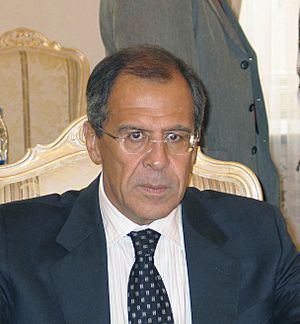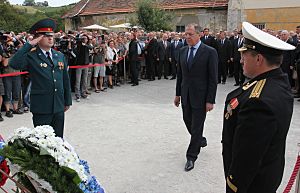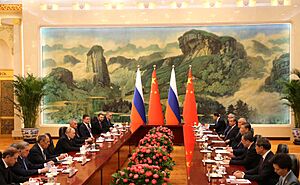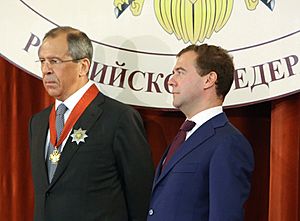Sergey Lavrov facts for kids
Quick facts for kids
Sergey Lavrov
|
|
|---|---|
| Сергей Лавров | |
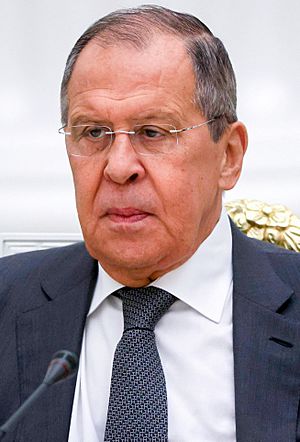
Lavrov in 2022
|
|
| Minister of Foreign Affairs | |
| Assumed office 9 March 2004 |
|
| President | |
| Prime Minister |
|
| Preceded by | Igor Ivanov |
| Ambassador of Russia to the United Nations | |
| In office 22 September 1994 – 12 July 2004 |
|
| Nominated by | Boris Yeltsin |
| Preceded by | Yuli Vorontsov |
| Succeeded by | Andrey Denisov |
| Personal details | |
| Born |
Sergey Viktorovich Lavrov
21 March 1950 Moscow, Russian SFSR, Soviet Union |
| Political party | United Russia |
| Spouse |
Maria Lavrova
(m. 1971) |
| Children | 1 |
| Alma mater | Moscow State Institute of International Relations |
| Awards | Hero of Labour of the Russian Federation; Full Cavalier of the Order "For Merit to the Fatherland" Cavalier of the Order of Saint Andrew the Apostle the First-Called |
| Signature |  |
Sergey Viktorovich Lavrov (Russian: Сергей Викторович Лавров; born 21 March 1950) is a Russian diplomat. A diplomat is someone who represents their country in talks with other nations. He has been the foreign minister of Russia since 2004. This means he is in charge of Russia's relationships with other countries. He has held this important job for a very long time, longer than any other foreign minister since the time of the Russian Empire.
Before becoming foreign minister, Lavrov was Russia's top representative at the United Nations. He held this role from 1994 to 2004.
Contents
Early Life and Education
Sergey Lavrov was born in Moscow, Russia, on March 21, 1950. His father was from Armenia, and his mother was Russian. His mother worked for the Soviet Ministry for Foreign Trade.
Lavrov was a good student and finished high school with a silver medal. He first thought about studying physics. However, he decided to study international relations at the Moscow State Institute of International Relations (MGIMO). He graduated from this university in 1972.
During his studies, Lavrov learned several languages. He became fluent in Sinhalese, which is spoken in Sri Lanka. He also learned Dhivehi, spoken in the Maldives. Besides these, he learned English and French. While at university, he also took part in student construction projects during his summer breaks. He even performed in drama shows with his classmates. He got married during his third year of university.
Career as a Diplomat
Working in Sri Lanka (1972–1976)
After graduating in 1972, Lavrov began working for the Soviet Foreign Ministry. He was sent to the Soviet embassy in Sri Lanka as an advisor. He was chosen because he was already an expert on the country. At that time, the Soviet Union and Sri Lanka worked closely on trade and economy.
The Soviet embassy in Sri Lanka also managed relations with the Maldives. Lavrov's job was to study the situation in Sri Lanka. He also worked as a translator and assistant. He earned the diplomatic rank of an attaché.
Returning to Moscow and the UN (1976–1994)
In 1976, Lavrov came back to Moscow. He worked in a section of the USSR Foreign Ministry that dealt with international economic relations. He helped analyze global issues and worked with international groups like the United Nations.
In 1981, he was sent to New York City. There, he worked as a senior advisor for the Soviet mission to the United Nations. He returned to Moscow in 1988. He became Deputy Chief of the Section for International Economic Relations. From 1990 to 1992, he was the Director of the International Organization of the Soviet Foreign Ministry.
During the early 1990s, the Soviet Union was changing. The Russian Foreign Ministry took over many duties from the Soviet Foreign Ministry. In April 1991, Lavrov became a deputy foreign minister. After the Soviet Union ended in December 1991, he continued working for the new Russian Federation's Foreign Ministry. In 1992, he was put in charge of the Department for International Organizations and Global Issues. He also oversaw human rights and international cultural cooperation. He was given the highest diplomatic rank, Ambassador Extraordinary and Plenipotentiary.
Russia's Representative to the UN (1994–2004)
Lavrov continued his work at the Ministry of Foreign Affairs until 1994. He then returned to the United Nations. This time, he was the Permanent Representative of Russia. This meant he was Russia's main voice at the UN.
While in this role, he served as the President of the United Nations Security Council several times. This happened in December 1995, June 1997, July 1998, October 1999, December 2000, April 2002, and June 2003.
Foreign Minister of Russia (2004–Present)
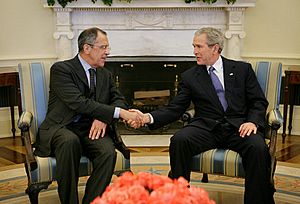
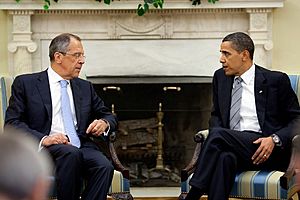
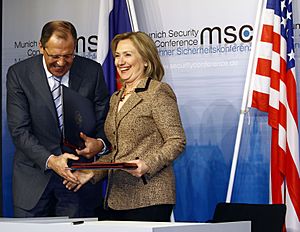
On March 9, 2004, President Vladimir Putin chose Lavrov to be the Minister of Foreign Affairs. He took over from Igor Ivanov.
Lavrov kept his position when Dmitri Medvedev was president from 2008 to 2012. He was reappointed foreign minister on May 21, 2012. He also kept his job in January 2020, when a new cabinet was formed.
Experts say Lavrov is a very skilled diplomat and negotiator. He is known for being tough and reliable in discussions.
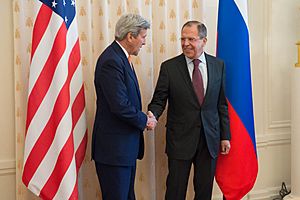
Personal Life
Sergey Lavrov is fluent in Russian, English, Dhivehi, French, and Sinhala.
He enjoys sports, especially watching football games. He is a big fan of the Moscow football club Spartak Moscow.
He has been married to Maria Lavrova since 1971. They have one daughter and two grandchildren. His daughter, Ekaterina Sergeyevna Lavrova, studied at Columbia University. She lived in the US and London for a long time. She is married to Russian businessman Alexander Vinokurov.
Honors and Awards
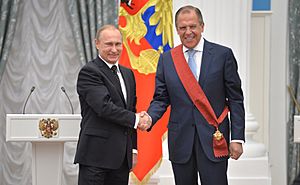
Sergey Lavrov has received many awards and honors for his diplomatic work.
Some of his Russian honors include:
- Hero of Labour of the Russian Federation (2020)
- Order "For Merit to the Fatherland" (various classes, from 1998 to 2015)
- Order of Honour (1996)
- Order of St. Andrew the Apostle the First-Called (2025)
He has also received honors from other countries, such as:
- Armenia: First Class of Order of St. Mesrop Mashtots (2010)
- Belarus: Medal of the Order of the Friendship of Peoples (Belarus) (2006)
- Kazakhstan: Grand Cordon Class of the Order of the Leopard (Kazakhstan) (2021)
- Serbia: First Class of the Order of the Serbian Flag (2016)
- United Arab Emirates: Collar of the Order of Etihad (2021)
See also
 In Spanish: Serguéi Lavrov para niños
In Spanish: Serguéi Lavrov para niños
- List of current foreign ministers
- Foreign relations of Russia
Images for kids
-
Putin, Lavrov and Indian Prime Minister Narendra Modi at the 2016 SCO Summit
-
Lavrov meets with President Donald Trump in the Oval Office of the White House, 10 May 2017
-
Putin, Lavrov, Israeli Prime Minister Benjamin Netanyahu and Israeli President Reuven Rivlin at the World Holocaust Forum, 23 January 2020
-
Antony Blinken, Joe Biden, Vladimir Putin and Lavrov at the 2021 Russia–United States summit in Geneva, Switzerland
 | Percy Lavon Julian |
 | Katherine Johnson |
 | George Washington Carver |
 | Annie Easley |


